SSC211 TMA01: Analyzing Civic Honesty Research Experiment Findings
VerifiedAdded on 2022/08/19
|8
|2016
|12
Homework Assignment
AI Summary
This assignment analyzes a 2019 research study on civic honesty, which investigated people's behavior when encountering lost wallets across various countries. The assignment begins by explaining the rationales for employing scientific research to understand civic honesty, highlighting its significance in fields like psychology and behavioral economics. It then evaluates the study's approach, arguing that it aligns with positivist social science due to its reliance on empirical data and the identification of causal factors influencing behavior. The assignment distinguishes positivism from interpretive and critical social science approaches. Finally, it discusses ethical considerations, identifying research practices that promote and compromise ethical principles, such as anonymity, informed consent, and the use of deception. The analysis emphasizes the importance of adhering to ethical guidelines in social science research to protect participants and ensure the integrity of findings.
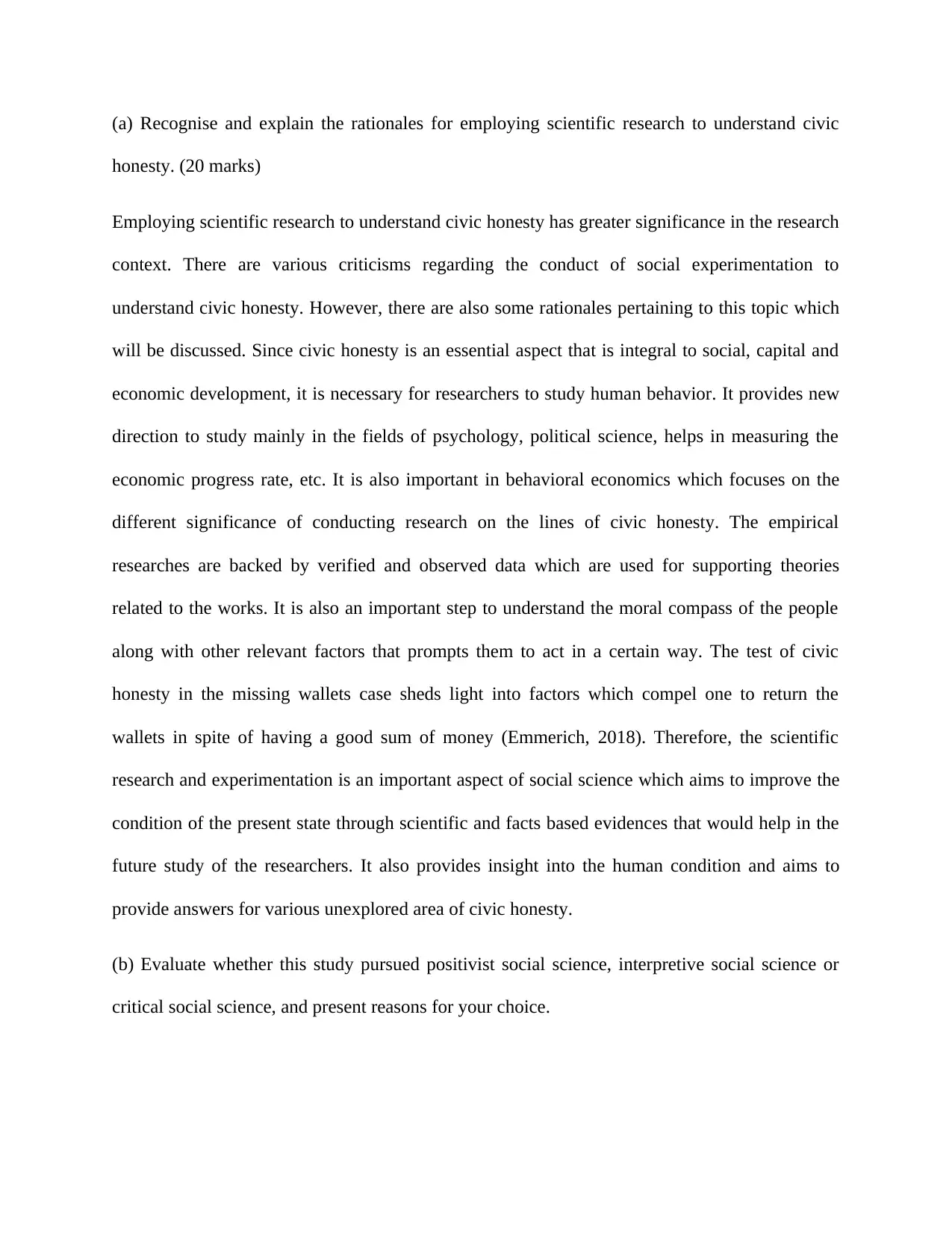
(a) Recognise and explain the rationales for employing scientific research to understand civic
honesty. (20 marks)
Employing scientific research to understand civic honesty has greater significance in the research
context. There are various criticisms regarding the conduct of social experimentation to
understand civic honesty. However, there are also some rationales pertaining to this topic which
will be discussed. Since civic honesty is an essential aspect that is integral to social, capital and
economic development, it is necessary for researchers to study human behavior. It provides new
direction to study mainly in the fields of psychology, political science, helps in measuring the
economic progress rate, etc. It is also important in behavioral economics which focuses on the
different significance of conducting research on the lines of civic honesty. The empirical
researches are backed by verified and observed data which are used for supporting theories
related to the works. It is also an important step to understand the moral compass of the people
along with other relevant factors that prompts them to act in a certain way. The test of civic
honesty in the missing wallets case sheds light into factors which compel one to return the
wallets in spite of having a good sum of money (Emmerich, 2018). Therefore, the scientific
research and experimentation is an important aspect of social science which aims to improve the
condition of the present state through scientific and facts based evidences that would help in the
future study of the researchers. It also provides insight into the human condition and aims to
provide answers for various unexplored area of civic honesty.
(b) Evaluate whether this study pursued positivist social science, interpretive social science or
critical social science, and present reasons for your choice.
honesty. (20 marks)
Employing scientific research to understand civic honesty has greater significance in the research
context. There are various criticisms regarding the conduct of social experimentation to
understand civic honesty. However, there are also some rationales pertaining to this topic which
will be discussed. Since civic honesty is an essential aspect that is integral to social, capital and
economic development, it is necessary for researchers to study human behavior. It provides new
direction to study mainly in the fields of psychology, political science, helps in measuring the
economic progress rate, etc. It is also important in behavioral economics which focuses on the
different significance of conducting research on the lines of civic honesty. The empirical
researches are backed by verified and observed data which are used for supporting theories
related to the works. It is also an important step to understand the moral compass of the people
along with other relevant factors that prompts them to act in a certain way. The test of civic
honesty in the missing wallets case sheds light into factors which compel one to return the
wallets in spite of having a good sum of money (Emmerich, 2018). Therefore, the scientific
research and experimentation is an important aspect of social science which aims to improve the
condition of the present state through scientific and facts based evidences that would help in the
future study of the researchers. It also provides insight into the human condition and aims to
provide answers for various unexplored area of civic honesty.
(b) Evaluate whether this study pursued positivist social science, interpretive social science or
critical social science, and present reasons for your choice.
Paraphrase This Document
Need a fresh take? Get an instant paraphrase of this document with our AI Paraphraser
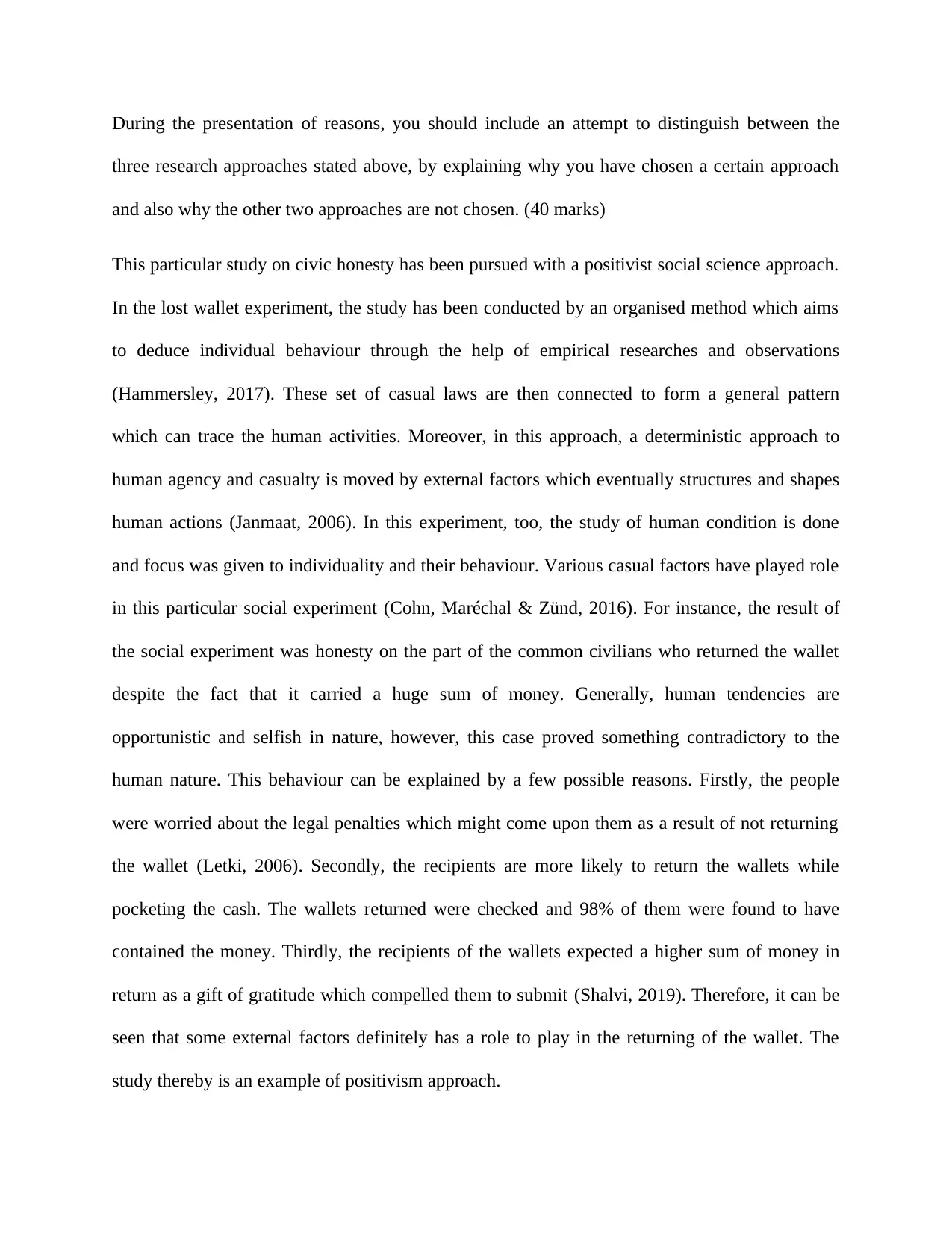
During the presentation of reasons, you should include an attempt to distinguish between the
three research approaches stated above, by explaining why you have chosen a certain approach
and also why the other two approaches are not chosen. (40 marks)
This particular study on civic honesty has been pursued with a positivist social science approach.
In the lost wallet experiment, the study has been conducted by an organised method which aims
to deduce individual behaviour through the help of empirical researches and observations
(Hammersley, 2017). These set of casual laws are then connected to form a general pattern
which can trace the human activities. Moreover, in this approach, a deterministic approach to
human agency and casualty is moved by external factors which eventually structures and shapes
human actions (Janmaat, 2006). In this experiment, too, the study of human condition is done
and focus was given to individuality and their behaviour. Various casual factors have played role
in this particular social experiment (Cohn, Maréchal & Zünd, 2016). For instance, the result of
the social experiment was honesty on the part of the common civilians who returned the wallet
despite the fact that it carried a huge sum of money. Generally, human tendencies are
opportunistic and selfish in nature, however, this case proved something contradictory to the
human nature. This behaviour can be explained by a few possible reasons. Firstly, the people
were worried about the legal penalties which might come upon them as a result of not returning
the wallet (Letki, 2006). Secondly, the recipients are more likely to return the wallets while
pocketing the cash. The wallets returned were checked and 98% of them were found to have
contained the money. Thirdly, the recipients of the wallets expected a higher sum of money in
return as a gift of gratitude which compelled them to submit (Shalvi, 2019). Therefore, it can be
seen that some external factors definitely has a role to play in the returning of the wallet. The
study thereby is an example of positivism approach.
three research approaches stated above, by explaining why you have chosen a certain approach
and also why the other two approaches are not chosen. (40 marks)
This particular study on civic honesty has been pursued with a positivist social science approach.
In the lost wallet experiment, the study has been conducted by an organised method which aims
to deduce individual behaviour through the help of empirical researches and observations
(Hammersley, 2017). These set of casual laws are then connected to form a general pattern
which can trace the human activities. Moreover, in this approach, a deterministic approach to
human agency and casualty is moved by external factors which eventually structures and shapes
human actions (Janmaat, 2006). In this experiment, too, the study of human condition is done
and focus was given to individuality and their behaviour. Various casual factors have played role
in this particular social experiment (Cohn, Maréchal & Zünd, 2016). For instance, the result of
the social experiment was honesty on the part of the common civilians who returned the wallet
despite the fact that it carried a huge sum of money. Generally, human tendencies are
opportunistic and selfish in nature, however, this case proved something contradictory to the
human nature. This behaviour can be explained by a few possible reasons. Firstly, the people
were worried about the legal penalties which might come upon them as a result of not returning
the wallet (Letki, 2006). Secondly, the recipients are more likely to return the wallets while
pocketing the cash. The wallets returned were checked and 98% of them were found to have
contained the money. Thirdly, the recipients of the wallets expected a higher sum of money in
return as a gift of gratitude which compelled them to submit (Shalvi, 2019). Therefore, it can be
seen that some external factors definitely has a role to play in the returning of the wallet. The
study thereby is an example of positivism approach.
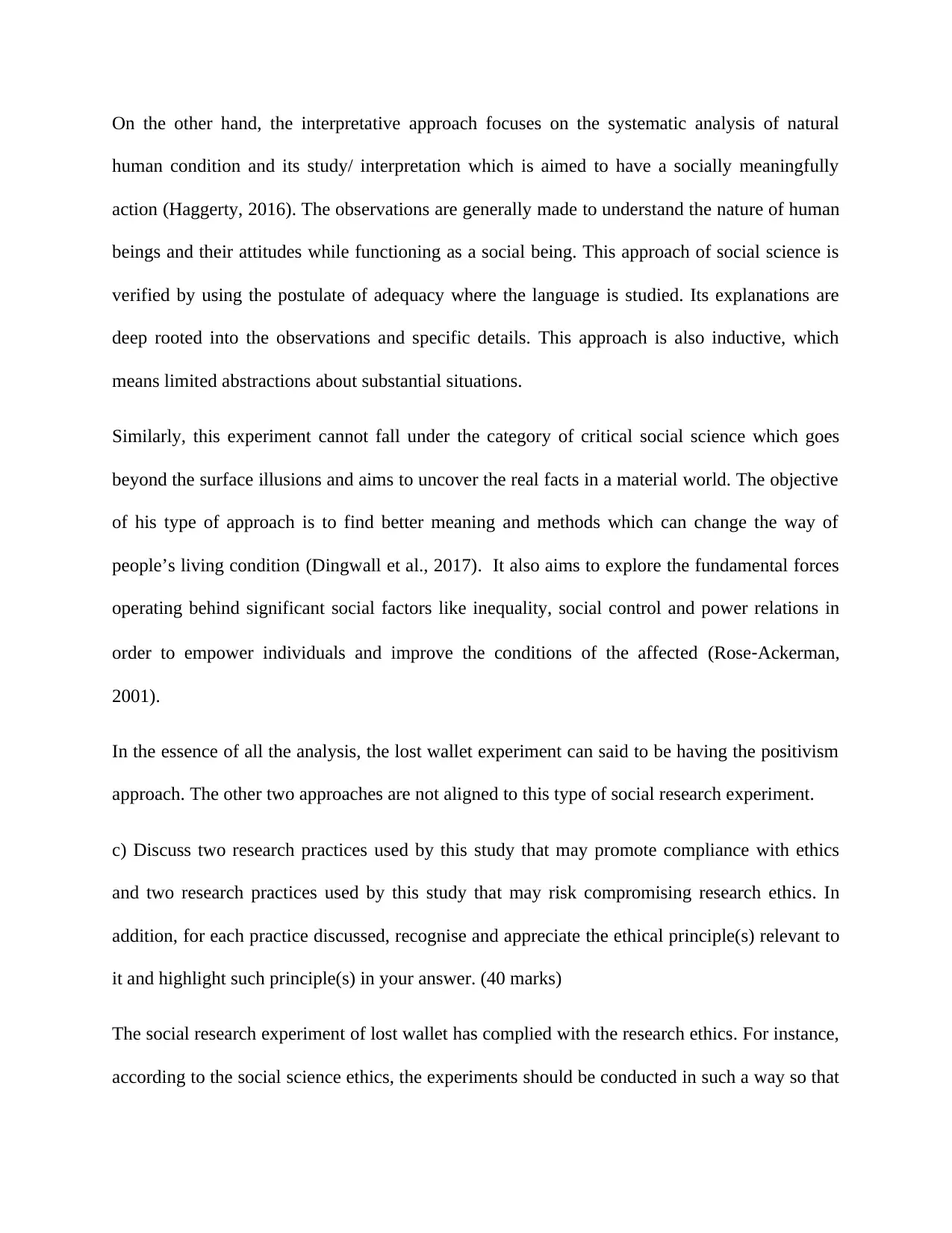
On the other hand, the interpretative approach focuses on the systematic analysis of natural
human condition and its study/ interpretation which is aimed to have a socially meaningfully
action (Haggerty, 2016). The observations are generally made to understand the nature of human
beings and their attitudes while functioning as a social being. This approach of social science is
verified by using the postulate of adequacy where the language is studied. Its explanations are
deep rooted into the observations and specific details. This approach is also inductive, which
means limited abstractions about substantial situations.
Similarly, this experiment cannot fall under the category of critical social science which goes
beyond the surface illusions and aims to uncover the real facts in a material world. The objective
of his type of approach is to find better meaning and methods which can change the way of
people’s living condition (Dingwall et al., 2017). It also aims to explore the fundamental forces
operating behind significant social factors like inequality, social control and power relations in
order to empower individuals and improve the conditions of the affected (Rose‐Ackerman,
2001).
In the essence of all the analysis, the lost wallet experiment can said to be having the positivism
approach. The other two approaches are not aligned to this type of social research experiment.
c) Discuss two research practices used by this study that may promote compliance with ethics
and two research practices used by this study that may risk compromising research ethics. In
addition, for each practice discussed, recognise and appreciate the ethical principle(s) relevant to
it and highlight such principle(s) in your answer. (40 marks)
The social research experiment of lost wallet has complied with the research ethics. For instance,
according to the social science ethics, the experiments should be conducted in such a way so that
human condition and its study/ interpretation which is aimed to have a socially meaningfully
action (Haggerty, 2016). The observations are generally made to understand the nature of human
beings and their attitudes while functioning as a social being. This approach of social science is
verified by using the postulate of adequacy where the language is studied. Its explanations are
deep rooted into the observations and specific details. This approach is also inductive, which
means limited abstractions about substantial situations.
Similarly, this experiment cannot fall under the category of critical social science which goes
beyond the surface illusions and aims to uncover the real facts in a material world. The objective
of his type of approach is to find better meaning and methods which can change the way of
people’s living condition (Dingwall et al., 2017). It also aims to explore the fundamental forces
operating behind significant social factors like inequality, social control and power relations in
order to empower individuals and improve the conditions of the affected (Rose‐Ackerman,
2001).
In the essence of all the analysis, the lost wallet experiment can said to be having the positivism
approach. The other two approaches are not aligned to this type of social research experiment.
c) Discuss two research practices used by this study that may promote compliance with ethics
and two research practices used by this study that may risk compromising research ethics. In
addition, for each practice discussed, recognise and appreciate the ethical principle(s) relevant to
it and highlight such principle(s) in your answer. (40 marks)
The social research experiment of lost wallet has complied with the research ethics. For instance,
according to the social science ethics, the experiments should be conducted in such a way so that
⊘ This is a preview!⊘
Do you want full access?
Subscribe today to unlock all pages.

Trusted by 1+ million students worldwide
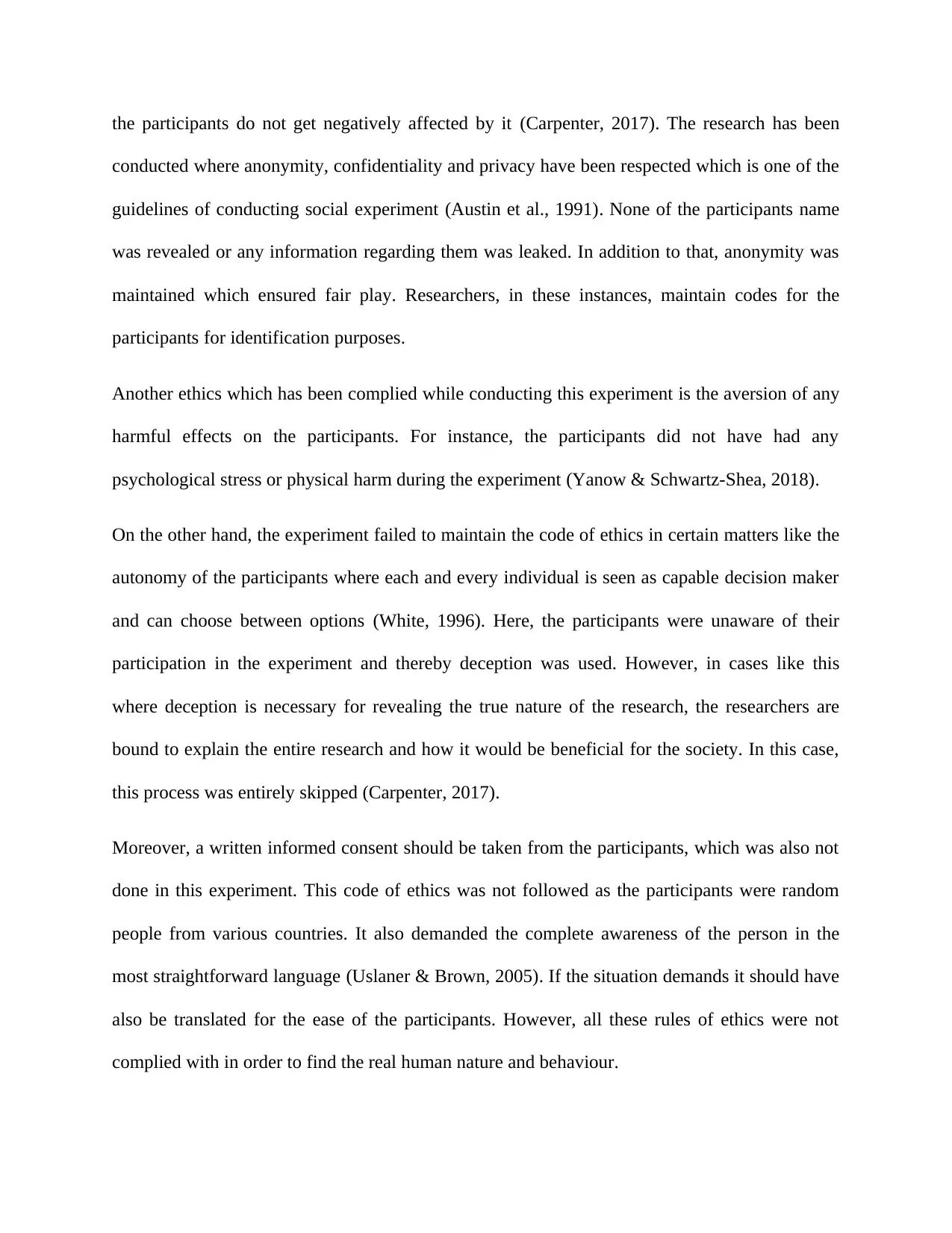
the participants do not get negatively affected by it (Carpenter, 2017). The research has been
conducted where anonymity, confidentiality and privacy have been respected which is one of the
guidelines of conducting social experiment (Austin et al., 1991). None of the participants name
was revealed or any information regarding them was leaked. In addition to that, anonymity was
maintained which ensured fair play. Researchers, in these instances, maintain codes for the
participants for identification purposes.
Another ethics which has been complied while conducting this experiment is the aversion of any
harmful effects on the participants. For instance, the participants did not have had any
psychological stress or physical harm during the experiment (Yanow & Schwartz-Shea, 2018).
On the other hand, the experiment failed to maintain the code of ethics in certain matters like the
autonomy of the participants where each and every individual is seen as capable decision maker
and can choose between options (White, 1996). Here, the participants were unaware of their
participation in the experiment and thereby deception was used. However, in cases like this
where deception is necessary for revealing the true nature of the research, the researchers are
bound to explain the entire research and how it would be beneficial for the society. In this case,
this process was entirely skipped (Carpenter, 2017).
Moreover, a written informed consent should be taken from the participants, which was also not
done in this experiment. This code of ethics was not followed as the participants were random
people from various countries. It also demanded the complete awareness of the person in the
most straightforward language (Uslaner & Brown, 2005). If the situation demands it should have
also be translated for the ease of the participants. However, all these rules of ethics were not
complied with in order to find the real human nature and behaviour.
conducted where anonymity, confidentiality and privacy have been respected which is one of the
guidelines of conducting social experiment (Austin et al., 1991). None of the participants name
was revealed or any information regarding them was leaked. In addition to that, anonymity was
maintained which ensured fair play. Researchers, in these instances, maintain codes for the
participants for identification purposes.
Another ethics which has been complied while conducting this experiment is the aversion of any
harmful effects on the participants. For instance, the participants did not have had any
psychological stress or physical harm during the experiment (Yanow & Schwartz-Shea, 2018).
On the other hand, the experiment failed to maintain the code of ethics in certain matters like the
autonomy of the participants where each and every individual is seen as capable decision maker
and can choose between options (White, 1996). Here, the participants were unaware of their
participation in the experiment and thereby deception was used. However, in cases like this
where deception is necessary for revealing the true nature of the research, the researchers are
bound to explain the entire research and how it would be beneficial for the society. In this case,
this process was entirely skipped (Carpenter, 2017).
Moreover, a written informed consent should be taken from the participants, which was also not
done in this experiment. This code of ethics was not followed as the participants were random
people from various countries. It also demanded the complete awareness of the person in the
most straightforward language (Uslaner & Brown, 2005). If the situation demands it should have
also be translated for the ease of the participants. However, all these rules of ethics were not
complied with in order to find the real human nature and behaviour.
Paraphrase This Document
Need a fresh take? Get an instant paraphrase of this document with our AI Paraphraser

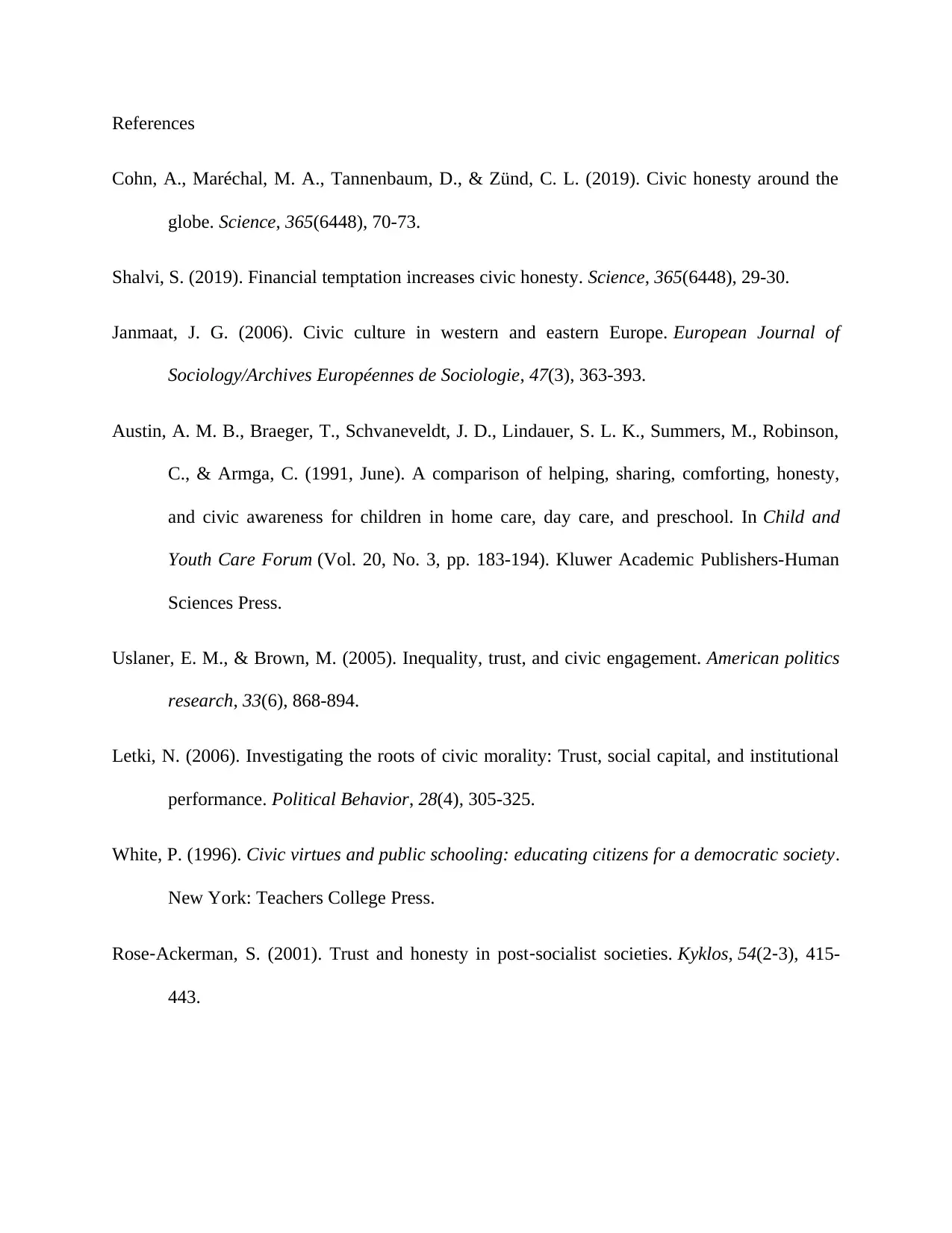
References
Cohn, A., Maréchal, M. A., Tannenbaum, D., & Zünd, C. L. (2019). Civic honesty around the
globe. Science, 365(6448), 70-73.
Shalvi, S. (2019). Financial temptation increases civic honesty. Science, 365(6448), 29-30.
Janmaat, J. G. (2006). Civic culture in western and eastern Europe. European Journal of
Sociology/Archives Européennes de Sociologie, 47(3), 363-393.
Austin, A. M. B., Braeger, T., Schvaneveldt, J. D., Lindauer, S. L. K., Summers, M., Robinson,
C., & Armga, C. (1991, June). A comparison of helping, sharing, comforting, honesty,
and civic awareness for children in home care, day care, and preschool. In Child and
Youth Care Forum (Vol. 20, No. 3, pp. 183-194). Kluwer Academic Publishers-Human
Sciences Press.
Uslaner, E. M., & Brown, M. (2005). Inequality, trust, and civic engagement. American politics
research, 33(6), 868-894.
Letki, N. (2006). Investigating the roots of civic morality: Trust, social capital, and institutional
performance. Political Behavior, 28(4), 305-325.
White, P. (1996). Civic virtues and public schooling: educating citizens for a democratic society.
New York: Teachers College Press.
Rose‐Ackerman, S. (2001). Trust and honesty in post‐socialist societies. Kyklos, 54(2‐3), 415-
443.
Cohn, A., Maréchal, M. A., Tannenbaum, D., & Zünd, C. L. (2019). Civic honesty around the
globe. Science, 365(6448), 70-73.
Shalvi, S. (2019). Financial temptation increases civic honesty. Science, 365(6448), 29-30.
Janmaat, J. G. (2006). Civic culture in western and eastern Europe. European Journal of
Sociology/Archives Européennes de Sociologie, 47(3), 363-393.
Austin, A. M. B., Braeger, T., Schvaneveldt, J. D., Lindauer, S. L. K., Summers, M., Robinson,
C., & Armga, C. (1991, June). A comparison of helping, sharing, comforting, honesty,
and civic awareness for children in home care, day care, and preschool. In Child and
Youth Care Forum (Vol. 20, No. 3, pp. 183-194). Kluwer Academic Publishers-Human
Sciences Press.
Uslaner, E. M., & Brown, M. (2005). Inequality, trust, and civic engagement. American politics
research, 33(6), 868-894.
Letki, N. (2006). Investigating the roots of civic morality: Trust, social capital, and institutional
performance. Political Behavior, 28(4), 305-325.
White, P. (1996). Civic virtues and public schooling: educating citizens for a democratic society.
New York: Teachers College Press.
Rose‐Ackerman, S. (2001). Trust and honesty in post‐socialist societies. Kyklos, 54(2‐3), 415-
443.
⊘ This is a preview!⊘
Do you want full access?
Subscribe today to unlock all pages.

Trusted by 1+ million students worldwide
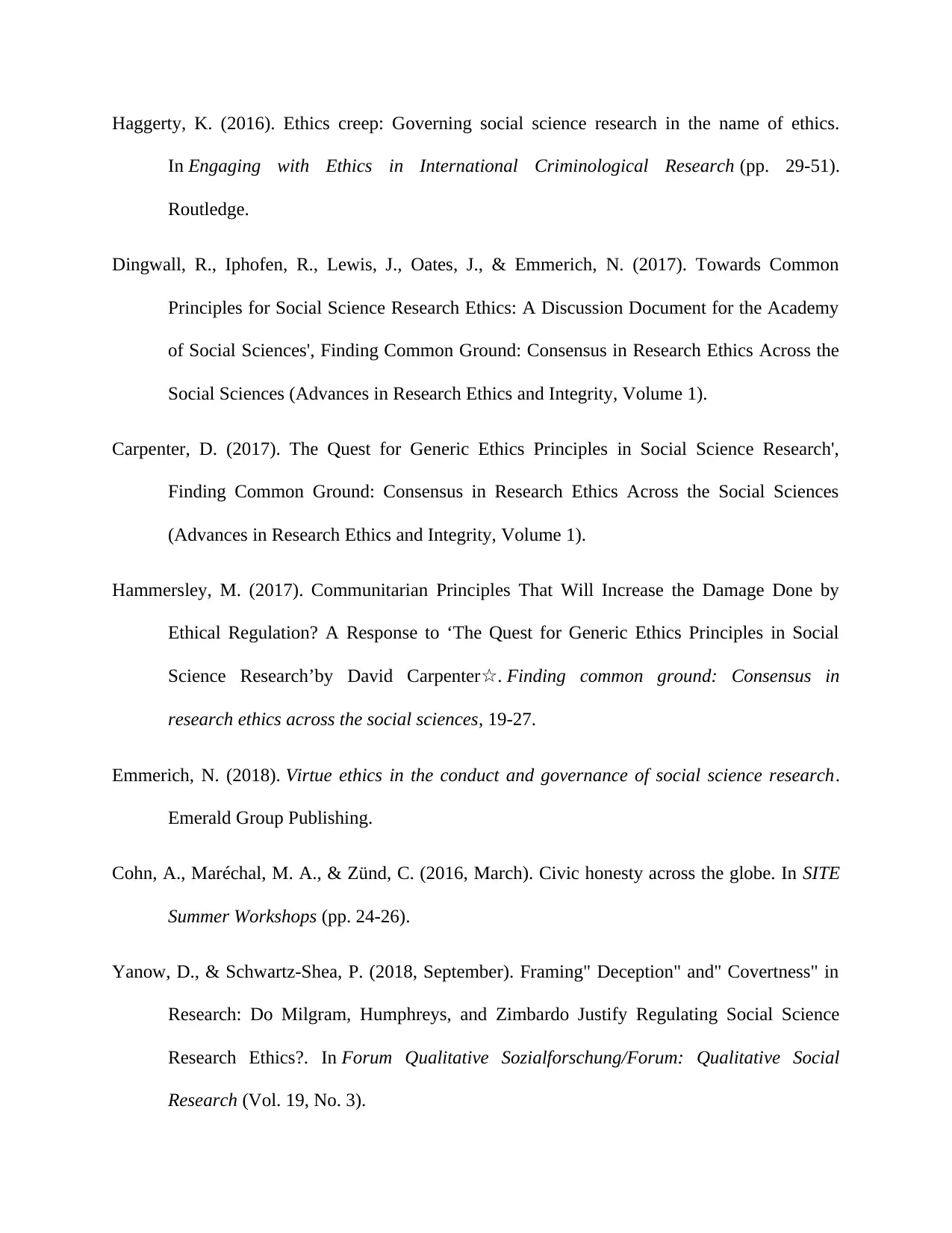
Haggerty, K. (2016). Ethics creep: Governing social science research in the name of ethics.
In Engaging with Ethics in International Criminological Research (pp. 29-51).
Routledge.
Dingwall, R., Iphofen, R., Lewis, J., Oates, J., & Emmerich, N. (2017). Towards Common
Principles for Social Science Research Ethics: A Discussion Document for the Academy
of Social Sciences', Finding Common Ground: Consensus in Research Ethics Across the
Social Sciences (Advances in Research Ethics and Integrity, Volume 1).
Carpenter, D. (2017). The Quest for Generic Ethics Principles in Social Science Research',
Finding Common Ground: Consensus in Research Ethics Across the Social Sciences
(Advances in Research Ethics and Integrity, Volume 1).
Hammersley, M. (2017). Communitarian Principles That Will Increase the Damage Done by
Ethical Regulation? A Response to ‘The Quest for Generic Ethics Principles in Social
Science Research’by David Carpenter☆. Finding common ground: Consensus in
research ethics across the social sciences, 19-27.
Emmerich, N. (2018). Virtue ethics in the conduct and governance of social science research.
Emerald Group Publishing.
Cohn, A., Maréchal, M. A., & Zünd, C. (2016, March). Civic honesty across the globe. In SITE
Summer Workshops (pp. 24-26).
Yanow, D., & Schwartz-Shea, P. (2018, September). Framing" Deception" and" Covertness" in
Research: Do Milgram, Humphreys, and Zimbardo Justify Regulating Social Science
Research Ethics?. In Forum Qualitative Sozialforschung/Forum: Qualitative Social
Research (Vol. 19, No. 3).
In Engaging with Ethics in International Criminological Research (pp. 29-51).
Routledge.
Dingwall, R., Iphofen, R., Lewis, J., Oates, J., & Emmerich, N. (2017). Towards Common
Principles for Social Science Research Ethics: A Discussion Document for the Academy
of Social Sciences', Finding Common Ground: Consensus in Research Ethics Across the
Social Sciences (Advances in Research Ethics and Integrity, Volume 1).
Carpenter, D. (2017). The Quest for Generic Ethics Principles in Social Science Research',
Finding Common Ground: Consensus in Research Ethics Across the Social Sciences
(Advances in Research Ethics and Integrity, Volume 1).
Hammersley, M. (2017). Communitarian Principles That Will Increase the Damage Done by
Ethical Regulation? A Response to ‘The Quest for Generic Ethics Principles in Social
Science Research’by David Carpenter☆. Finding common ground: Consensus in
research ethics across the social sciences, 19-27.
Emmerich, N. (2018). Virtue ethics in the conduct and governance of social science research.
Emerald Group Publishing.
Cohn, A., Maréchal, M. A., & Zünd, C. (2016, March). Civic honesty across the globe. In SITE
Summer Workshops (pp. 24-26).
Yanow, D., & Schwartz-Shea, P. (2018, September). Framing" Deception" and" Covertness" in
Research: Do Milgram, Humphreys, and Zimbardo Justify Regulating Social Science
Research Ethics?. In Forum Qualitative Sozialforschung/Forum: Qualitative Social
Research (Vol. 19, No. 3).
Paraphrase This Document
Need a fresh take? Get an instant paraphrase of this document with our AI Paraphraser

1 out of 8
Related Documents
Your All-in-One AI-Powered Toolkit for Academic Success.
+13062052269
info@desklib.com
Available 24*7 on WhatsApp / Email
![[object Object]](/_next/static/media/star-bottom.7253800d.svg)
Unlock your academic potential
Copyright © 2020–2026 A2Z Services. All Rights Reserved. Developed and managed by ZUCOL.



